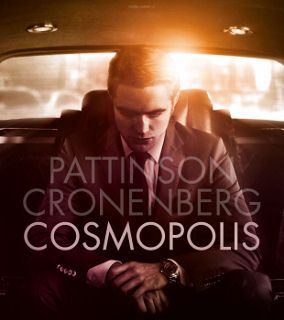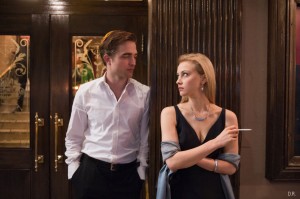COSMOPOLIS: FILMING THE UNFILMABLE
To properly critique David Cronenberg’s Cosmopolis, the relationship between film and literature should be addressed in both a general and historical sense. The challenge that cinema placed upon the primacy of literature in the last century has resulted in marketplace rivalry. As with any respectable products, the two began to differentiate: Film became the reserve of action, plot, emotion, and expressiveness, while literature moved inside the head to the world of personalities, intricacies, and ideas.
One of the literary forms arising from this division has been the novel of ideas. These novels are distinguished by their intellect and interiorism’”the theory that truth is discovered by introspection rather than by examination of the outside world. These are the books that dwell for 60 pages on the implications of a single idea. They take words and locate their origin, trace their genealogy, examine their modern meaning, inspect all the ham shavings of implication.
Consequently. novels of ideas are considered unfilmable, and there have been few attempts to make them. While Cormac McCarthy Westerns have enough action to translate naturally to the screen, the only novel of ideas-turned-film popping to mind is Milan Kundera’s The Unbearable Lightness of Being, the granddaddy of this literary genre. In adapting Don DeLillo’s 2003 novel of ideas, the challenge facing David Cronenberg (Videodrome, Eastern Promises) doesn’t take 60 pages to describe. It’s this: how do you film a story that doesn’t want to be filmed?
His answer is savvy, but maybe too smart by half. Bravely, interestingly, but arguably half-effectively, he violates the peace treaty that has held the line for a few decades: he makes a movie about people who sit and talk about ideas, as in a book. Cosmopolis goes so far as to have a final shootout with two men who would rather trade bon mots than bullets.
These rounds of sitting, to be precise, occur in the back of a limousine, where young, libidinous billionaire Eric Packer (Twilight’s icy Robert Pattinson) crosses Manhattan at a glacial pace on a mission for a haircut (the President’s visit to NYC creates a traffic nightmare). At present, Packer’s fortune is taking a haircut in a different way’”he’s losing billions from investments in the Chinese Yuan. As he rides, he holds court with a doctor, a former employee (Paul Giamatti), advisors (Jay Baruchel and Emily Hampshire), and a mistress (Juliette Binoche). These figures enter the limo, ruminate on money or the world, and exit to real life. In reality, this is not a trip for a haircut: Packer’s bodyguard (Kevin Durand) warns him about an imminent attempt on his life, so this limo ride seems more like his own surreal funeral procession.
This is not mainstream Cronenberg (The Fly) but weird Cronenberg (Naked Lunch), and Cosmopolis is sautéed in a slumgullion of weirdness; rats are everywhere (live rats, dead rats, felt rats and the notion of rats as currency); and rational time seems to evaporate (Packer experiences several spectral meetings with his ghostly wife (Sarah Gadon) that seem to take place out of space and time). There’s a seductively stilted atmosphere reminiscent of Werner Herzog’s 1972 Aguirre, the Wrath of God.
The results, as you might expect, are uneven; some viewers may have difficulty getting past the mental density and jargony dialogue inherited from the novel. But then Samantha Morton mesmerizes with a 10-minute monologue on progress, strife, time, and money; the problem for society, she tells the young master, is that billionaires have reduced money to an abstraction; what does it mean to spend a dollar when it is now essentially a point in a game? Other ramblings are meandering and flat. All are difficult to follow, but interesting to nibble.
Cosmopolis might have been easier to receive were it not for Terrence Malick’s The Tree of Life last year: rather than discuss ideas, the Cannes winner turns them into visuals which incorporate radical editing to distort time; in essence, The Tree of Life radicalizes its form so that it becomes a film of ideas. The failure to find that sort of radical departure is the reason why Cosmopolis doesn’t achieve as much as it could have.
photos courtesy of Alfama Films
Cosmopolis
produced by Alfama Films, Kinology, Prospero Pictures, Toronto Antenna
distributed by eOne Films
MPAA rating: R; running time 108 minutes
in current release





